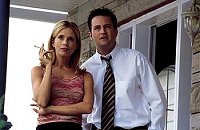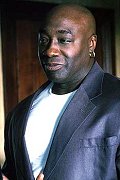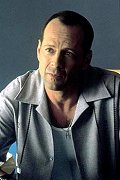The Whole Nine Yards
 for some sexuality/nudity and violence.
for some sexuality/nudity and violence.
Reviewed by: Brett Willis
STAFF WRITER
| Moral Rating: | Very Offensive |
| Moviemaking Quality: |
|
| Primary Audience: | Adults |
| Genre: | Comedy |
| Length: | 1 hr. 43 min. |
| Year of Release: | 2000 |
| USA Release: |


| Featuring |
|---|
| Bruce Willis, Amanda Peet, Matthew Perry, Natasha Henstridge, Michael Clarke Duncan |
| Director |
|
Jonathan Lynn |
| Producer |
| Elie Samaha, Andrew Stevens |
| Distributor |
Here’s another violent action film that uses impossible plot twists and bad taste jokes to cover up for a lack of creative writing.
Dr. Nicholas “Oz” Oseransky (Matthew Perry, TV’s “Friends”), a Montreal dentist, gets nervous when he learns that his new neighbor is a Chicago hitman, Jimmy the Tulip (Bruce Willis), who got early release from prison by ratting out his boss. Oz’s wife suggests that he report Jimmy’s whereabouts to the new mob boss and collect a finder’s fee. From there on, it’s one double-cross after another.
Profanity is extreme. There are several instances of implied sex without visible nudity; there’s non-sexual nudity when a girl deliberately exposes herself to distract some men so her partner can kill them. Some of the comedy is funny; but much of it is of the dark variety, making fun of subjects that should be left alone. Even the mob boss’s accent seems to be done badly on purpose. There’s violence, threatened violence, and several on-screen killings; the film is basically an inter-gangster fight over money and revenge. Human life is treated as cheap and expendable, and Oz (who’s caught in the middle of it all) is constantly ridiculed for his stance that no one should be killing anyone. Most of those who are killed (as well as most of those who are not killed) are mobsters and other criminals, although there’s one undercover cop involved. In the midst of this cutthroat lifestyle, a number of people find “true love.” Yeah, sure.
When Bruce Willis made the first “Die Hard” film in 1989, he said playing an action-hero part was the fulfillment of a little-boy type dream. Since then he’s done a ton of action films; he’s been the hero, the villain and in between; and he often shows his comedy roots in action parts. I doubt that he dreamed of doing all that; he and the studios are, of course, just going with what sells. In a recent interview, Willis basically said that it’s not movies but a bad childhood environment that creates psychopaths, and I agree. However, a constant diet of this kind of film has a desensitizing effect. For a well-balanced person, that effect might be to become a little less concerned about the needs of real-life crime victims. For someone who’s already psychopathic (that is, has some degree of Antisocial Personality Disorder) but has so far been just a general nuisance, the effect might be to lower his inhibitions and help push him into his first kill. When the violence is tied to sexuality (as some in this film is), the potential dangers are even greater. As school shootings trickle down even into first grade and pressure for media regulation is mounting, some screenwriters and film execs are coming dangerously close to admitting what we all know—that there’s a connection between movie violence and the real thing.
VIOLENCE—How does viewing violence in movies affect families? Answer



